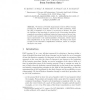Free Online Productivity Tools
i2Speak
i2Symbol
i2OCR
iTex2Img
iWeb2Print
iWeb2Shot
i2Type
iPdf2Split
iPdf2Merge
i2Bopomofo
i2Arabic
i2Style
i2Image
i2PDF
iLatex2Rtf
Sci2ools
101
click to vote
ICANN
2003
Springer
2003
Springer
Learning Rule Representations from Boolean Data
We discuss a Probably Approximate Correct (PAC) learning paradigm for Boolean formulas, which we call PAC meditation, where the class of formulas to be learnt is not known in advance. We split the building of the hypothesis in various levels of increasing description complexity according to additional inductive biases received at run time. In order to give semantic value to the learnt formulas, the key operational aspect represented is the understandability of formulas, which requires their simplification at any level of description. We deepen this aspect in light of two alternative simplification methods, which we compare through a case study.
Related Content
| Added | 06 Jul 2010 |
| Updated | 06 Jul 2010 |
| Type | Conference |
| Year | 2003 |
| Where | ICANN |
| Authors | Bruno Apolloni, Andrea Brega, Dario Malchiodi, Giorgio Palmas, Anna Maria Zanaboni |
Comments (0)

